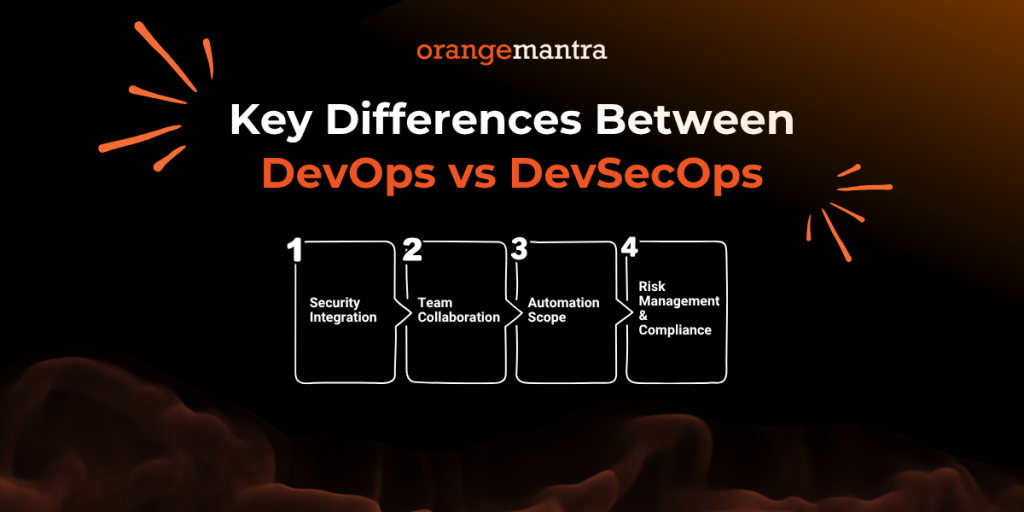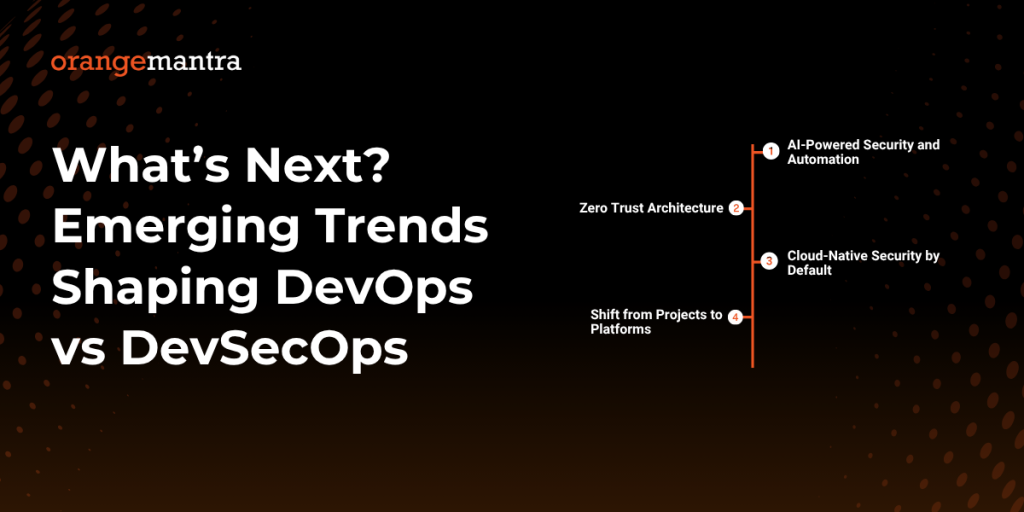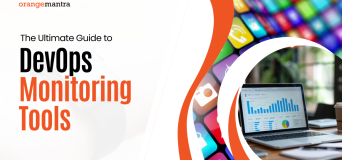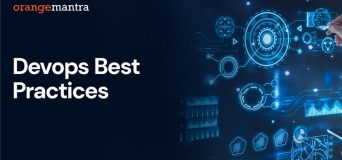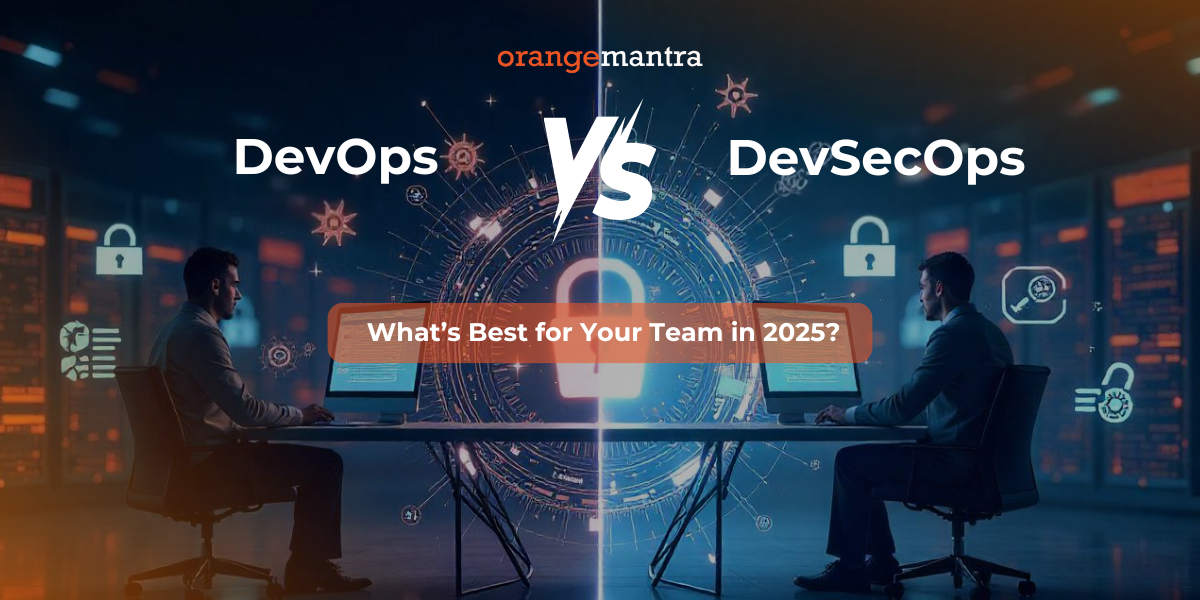
In today’s evolving development landscape, choosing between DevOps and DevSecOps can significantly impact your team’s agility, security, and delivery speed. This blog breaks down the key differences between DevOps and DevSecOps in 2025 and helps you decide which model best aligns with your business goals.
Here’s what you will learn from this blog:
- The core differences between DevOps and DevSecOps in 2025
- When to choose DevSecOps over traditional DevOps
- Tools and practices used in both models
- Which model aligns better with cloud-native, agile, and enterprise development goals
Fast software releases often come at a price—security risks. In fact, 64% of data breaches in 2024 were related to third-party vulnerabilities. That’s why teams are rethinking their approach. DevOps vs DevSecOps are two popular approaches that businesses often are confused about.
DevOps cloud solutions have been there for a while now. It helped speed up software delivery by making developers and operations work together. But now, teams are asking: “Where does security fit in?”
This is where DevSecOps steps in. It adds security checks right into the development process, not after.
However, as companies face growing threats and tighter rules, choosing between DevOps vs DevSecOps has become important for business tech decisions.
Table of Contents
What is DevOps and DevSecOps at a Glance?
Before we dive deep into the DevSecOps Vs DevOps differences, let’s understand what each of these terms means in simple words.
What is DevOps?
DevOps is short for Development and Operations. It’s a way of working where developers and IT operations teams work together to build, test, and release software faster. The goal is to make the process smooth, automated, and quick, so updates can go live without long delays.
Think of DevOps consulting services as an assembly line that helps teams release software quickly and often. By integrating devops monitoring tools into this assembly line, teams gain real-time visibility into every stage of the process, ensuring that speed never comes at the cost of stability or performance.
What is DevSecOps?
DevSecOps company adds Security into that same process. It makes sure security checks are done at every step, from writing code to launching the final product. Instead of waiting until the end to fix problems, teams catch them early.
It’s like having a safety inspector working side-by-side with the builders, instead of showing up after the building is done.
| Feature | DevOps | DevSecOps |
| Main Focus | Speed, teamwork, automation | Security + Speed, teamwork, automation |
| Who’s Involved | Developers + Operations | Developers + Operations + Security Teams |
| Security Checks | Usually after development | Built-in from start to finish |
| Tools Used | Jenkins, Docker, Ansible, etc. | Same tools + Security tools (e.g. SAST) |
| Best For | Teams focused on fast delivery | Teams that need both speed and security |
DevOps Vs DevSecOps: Key Differences
At first glance, DevOps and DevSecOps may look very similar. But when you dig a little deeper, their goals and methods clearly stand apart. Let’s look at how they really differ.
1. Security Integration
DevOps implementation focuses on building and shipping code fast. Security is often added at the end or handled by a separate team.
DevSecOps puts security at every step—from planning to deployment. It “shifts left,” meaning problems are caught early, saving time and cost later.
Why it matters: Fixing bugs early is cheaper and safer than waiting until after launch.
2. Team Collaboration
DevOps services join development and operations teams to work together.
DevSecOps includes security experts from day one. Everyone shares responsibility for safe, secure software.
Why it matters: Security is no longer one team’s job—it’s everyone’s job.
3. Automation Scope
DevOps automation services help build, test, and deploy solutions. DevSecOps adds automation for security scans, compliance checks, and vulnerability tests.
Why it matters: Automated security means fewer human errors and faster feedback.
4. Risk Management and Compliance
DevOps monitoring may overlook security or compliance early on, leading to risks later.
DevSecOps helps meet rules like GDPR, HIPAA, and PCI-DSS by building compliance into the pipeline.
Why it matters: Many industries can’t afford to skip compliance—it’s the law.
DevOps Vs DevSecOps: Benefits and Challenges
DevOps Vs DevSecOps both offer powerful benefits, but each comes with its own set of trade-offs. Understanding these can help your team pick the right fit.
Benefits of DevOps Services
- Faster Releases: Code moves quickly from idea to live product.
- Better Collaboration: Development and DevOps engineers work as one unit.
- Increased Efficiency: Automation reduces manual steps and speeds up delivery.
- Continuous Delivery: Frequent updates keep customers happy.
Best for: Cloud DevOps solutions are good for startups and fast-moving teams that want to launch quickly and improve as they go.
Benefits of DevSecOps Services
- Built-in Security: Issues are caught early, not after release.
- Cost Savings: Fixing bugs during development is cheaper than fixing breaches later.
- Compliance-Ready: Easier to meet rules like GDPR or HIPAA.
- Improved Trust: Secure apps build user confidence.
Best for: Enterprises or industries where data privacy and safety are critical.
Challenges of DevOps Services
- Security Gaps: Can miss threats if security isn’t included from the start.
- Limited Compliance: May not meet legal standards without extra steps.
- Post-Release Fixes: Bugs found late can delay launches or damage reputation.
Challenges of DevSecOps Services
- Slower Start: Adding security checks can delay early releases.
- Team Training Needed: Developers may need to learn new tools and security basics.
- Tool Overload: More tools can mean more setup and integration effort.
Also Read – SRE Vs DevOps: Key Differences, Use Cases, and How They Work Together
Tools and Best Practices: DevOps and DevSecOps
The success of DevOps or DevSecOps depends a lot on the tools you use—and how smartly you use them. Let’s look at the common tools and some best practices that help teams get the most out of each approach.
DevOps Tools
DevOps tools focus on making the software delivery process fast and reliable.
| Category | Popular Tools |
| CI/CD Pipelines | Jenkins, GitLab CI/CD, CircleCI |
| Configuration | Ansible, Chef, Puppet |
| Containerization | Docker, Kubernetes, OpenShift |
| Infrastructure as Code | Terraform, AWS CloudFormation |
| Monitoring | Prometheus, Grafana, New Relic |
Goal: Automate code build, test, and release without manual steps.
DevSecOps Tools
DevSecOps tools include everything DevOps uses—plus security scanners and compliance tools.
| Security Area | Tools |
| Static App Testing (SAST) | SonarQube, Checkmarx, Fortify |
| Dynamic App Testing (DAST) | OWASP ZAP, Burp Suite, Acunetix |
| Software Composition Analysis | Snyk, WhiteSource, Black Duck |
| Container Security | Anchore, Clair, Aqua Security |
| Compliance & Audits | OpenSCAP, Chef InSpec, Prisma Cloud |
Goal: Catch security risks early and meet industry regulations.
Best Practices for Both: DevSecOps and DevOps
Start with culture: Tools don’t work without team support and shared goals.
Automate wisely: Don’t overcomplicate—focus on what saves time and adds value.
Integrate security early: Even in DevOps, basic checks like code reviews can help.
Keep learning: Security threats change often. So should your tools and tactics.
Also Read – Top DevOps Consulting Companies to Know in 2025
When to Choose DevOps & DevSecOps
Not every team needs the same level of security on day one. Choosing between a DevOps and DevSecOps company depends on your team’s size, goals, and industry rules. Here’s how to decide what fits your needs in 2025.
Choose DevOps Services If…
- You’re a startup or small team focused on launching quickly.
- Your product doesn’t handle sensitive user data (like health or financial info).
- You want to test ideas fast and improve them later.
- Security is handled by a separate team or external partners.
DevOps implementation works best when speed, flexibility, and simplicity are top priorities.
Choose a DevSecOps Company If…
- You work in regulated industries (finance, healthcare, government, etc.).
- Your product involves user data, payments, or compliance requirements.
- You want security built-in, not added later.
- You aim to prevent issues rather than fix them after launch.
DevSecOps is ideal when trust, data safety, and long-term stability matter most.
Still Not Sure? Ask These Questions:
- Does your team understand security or need training?
- Can you afford delays if a security bug is found late?
- Are you subject to audits or data privacy laws?
If your answer is “yes” to any of these, a DevSecOps company may be the smarter choice—even if it takes more setup in the beginning.
What’s Next? Emerging Trends Shaping DevOps & DevSecOps
We understood the difference between DevOps and DevSecOps. Now, as technology evolves, so do the methods we use to build and protect software. In 2025 and beyond, both DevOps monitoring and DevSecOps are being reshaped by new trends. Here’s what teams should keep an eye on:
1. AI-Powered Security and Automation
AI is no longer just a buzzword—it’s changing how we write, test, and secure code. Tools now use machine learning to:
- Detect bugs before they happen
- Predict risky code patterns
- Automate security checks without slowing down teams
Why it matters: Faster, smarter decisions with less manual effort.
2. Zero Trust Architecture
The old model of “trust but verify” is gone. Now it’s “trust no one, verify everything.” DevSecOps supports this model by:
- Embedding security at every layer
- Checking access continuously
- Reducing insider and outsider threats
Why it matters: Safer systems—even in remote or cloud environments.
3. Cloud-Native Security by Default
More apps are built in the cloud using containers, microservices, and serverless tech. DevSecOps is adapting by:
- Securing APIs and Kubernetes clusters
- Automating scans for cloud vulnerabilities
- Ensuring compliance across hybrid cloud setups
Why it matters: As cloud use grows, so does the attack surface.
Shift from Projects to Platforms
DevOps assessment is evolving into Platform Engineering—building reusable systems, not just one-off pipelines. Security is becoming part of that platform:
- Pre-built pipelines with security baked in
- Shared tools and standards for all teams
- Better scalability and governance
Why it matters: Easier for growing teams to stay secure at scale.
Which Path Fits Your Team Best in 2025?
Choosing between DevOps & DevSecOps depends on your team’s goals.
If you want to build and launch software quickly, DevOps services are a great place to start. But if your product deals with user data or follows strict rules (like in healthcare or finance), DevSecOps is a better choice because it adds security from the beginning.
Both ways of working are useful. What matters most is picking the one that matches your needs today—and gets you ready for tomorrow.
Need help choosing the right approach?
At OrangeMantra, we’ve helped businesses of all sizes build faster, safer, and smarter software. Whether you’re just starting with DevOps or planning a secure shift to DevSecOps, our experts can guide you every step of the way.
Frequently Asked Questions
Here are answers to some of the most common questions people ask when choosing between DevOps and DevSecOps.
1. What is the difference between DevOps and DevSecOps?
DevOps focuses on collaboration between development and operations, while DevSecOps integrates security throughout the entire software development lifecycle.
2. Which is better for modern teams: DevOps or DevSecOps?
DevSecOps is generally better for teams that prioritize security from the start, while DevOps works well for teams focused on speed and automation without baked-in security processes.
3. Which tools are essential for DevSecOps?
Some important tools for DevSecOps include:
- SAST: SonarQube, Checkmarx (checks code for errors)
- DAST: Burp Suite, OWASP ZAP (finds security holes from outside)
- SCA: Snyk, WhiteSource (checks third-party code for known issues)
- Plus: Jenkins, Docker, GitLab (for DevOps tasks)
4. Why is DevSecOps gaining popularity over DevOps in 2025?
As cybersecurity threats evolve, DevSecOps offers a proactive approach to building secure applications, making it a preferred choice for many organizations in 2025.
5. When should a company switch from DevOps to DevSecOps?
A company should consider switching to DevSecOps when handling sensitive data, dealing with strict compliance regulations, or experiencing security gaps in their DevOps pipeline.
6. Do DevOps and DevSecOps require different tools?
While both share tools like Jenkins, GitLab, and Kubernetes, DevSecOps adds security-focused tools like Snyk, Aqua, and Checkmarx for continuous threat monitoring.
7. Can DevOps and DevSecOps coexist in a hybrid model?
Yes, many organizations in 2025 implement hybrid models where core DevOps teams collaborate with embedded security engineers to create a DevSecOps-aware culture.
8. Should my organization adopt DevSecOps, and how do we start?
If your product handles personal data, or you work in a field with strict rules, yes—you should start using DevSecOps. Start small:
- Add one or two security tools to your current DevOps process
- Train your team
- Get help from experts if needed (like OrangeMantra)
The goal is to make security a habit, not an afterthought.

